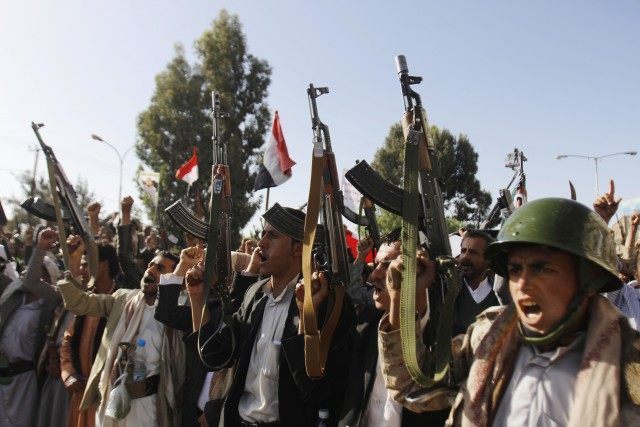Yemeni Deputy Chief of Staff Gen. Nasir al-Tahiri is accusing the Shiite Houthi rebels that have run the official government out of the nation’s capital of hiring African “mercenaries” to fight in the nation’s ongoing civil war.
Speaking to Al Arabiya, a Saudi news outlet, al-Tahiri asserted that the government — based in Aden since their expulsion from Sanaa — had evidence that the Houthis had begun paying citizens of African countries to travel to Yemen and fight against the official government. “Deputy Chief of Staff Gen. Nasir al-Tahiri said the move by the Houthis and forces allied to to the toppled Ali Abdullah Saleh was to buttress their weakening fronts at the capital Sanaa and the northwestern governorate of Saada,” Al Arabiya noted.
The accusation follows claims by the official government that also among the Houthi ranks are members of Hezbollah, the Lebanese-Iranian terrorist organization. Both the Houthi rebels and Hezbollah are Shiite Muslims; the official government of Yemen is allied with Sunni stronghold Saudi Arabia. “The government has documents and circumstantial evidence that prove the extent of Hezbollah’s involvement in the war waged by the Houthi militias against the Yemeni people,” government spokesman Rajeh Badi said this week. The official government is claiming it will take its case against Hezbollah for “hostile actions against legality and the Arab coalition” to the United Nations. Saudi Arabia is fighting alongside the official government with a number of Arab allies in the region.
In addition to foreigners flooding in to join al-Qaeda and the Islamic State, and the claim that Hezbollah fighters and African mercenaries are working with the Houthi insurgency, numerous reports have indicated that both sides in the war have relied on Afghan migrants to fight on their behalf. In January, Afghan Khaama Press reported that families in Afghanistan had begun protesting that their relatives, traveling to Saudi Arabia for their Hajj pilgrimage, had been forced to fight in Yemen after disappearing. “A man whose relative has been deployed to Yemen two months ago told BBC Persian that six to seven members of his family have left for Yemen after visiting Saudi Arabia for Umra Hajj pilgrimage,” Khaama reported, noting that it was unclear for whom they were believed to be fighting.

COMMENTS
Please let us know if you're having issues with commenting.